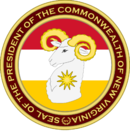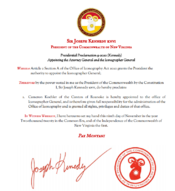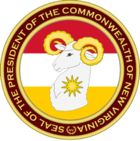President of New Virginia
| President of the Commonwealth of New Virginia | |
|---|---|
 Presidential standard | |
 Presidential seal | |
| Style | His Excellency The Right Honourable (formal) Mr. President (informal) |
| Status | Head of state |
| Member of | Parliament National Security Council |
| Residence | None official |
| Nominator | Electoral College members or self-nomination |
| Appointer | Electoral College |
| Term length | 2 years |
| Inaugural holder | Dame Brooklyn Hewitt |
| Formation | 1 August 2020 |
| Succession | President of the Senate (becomes acting president) |
The President of the Commonwealth of New Virginia, also known simply as the President of New Virginia, is the head of state of the Commonwealth of New Virginia. The President serves as the representative of national unity over partisan politics, the guarantor and protector of the Constitution of New Virginia, and the commander-in-chief of the New Virginian Defence Force; as such, the President is forbidden from holding membership in any political party.
The President is elected to serve for a two year term by an Electoral College consisting of most prominent national government officials, and there is no limit on the amount of terms a President can serve. The President's powers are enumerated by Chapter II of the Constitution, and include powers such as the authority to promulgate Acts of Parliament and to issue proclamations. The President is forbidden from holding any ministerial or judicial office or a seat in either house of Parliament for the duration of their term. The President does not belong to any particular branch of government, and has certain rights and authorities within each of them. There is no official residence for the President; however, it is common practice for the president's residence to be referred to as "Government House" for the duration of the President's time in office.
The office of President was established with the enactment of the Constitution by referendum on 1 August 2020. Dame Brooklyn Hewitt, the leader of the provisional government which governed following the Commonwealth's secession, was elected to serve as the first President. Following President Hewitt's resignation of 2 August 2021, Sir Adam Belcher has assumed the position of Acting President.
Origin and history
Prior to the enactment of the Constitution the Commonwealth was led by a provisional government known as the Provisional Council, which was vested with all legislative, executive and judicial authorities of the state. The Provisional Council was led by its Chairman, who was elected by the provisional councillors from among themselves. The Chairman of the Provisional Council (often colloquially referred to as the Provisional Chairman) fulfilled the duties of head of state and head of government, and has been described by modern sources as wielding near-dictatorial powers. Dame Brooklyn Hewitt, a leading figure of the New Virginian independence movement and former Prime Minister of Austenasia, was chosen by the Provisional Council to serve as its Chairman. He would be the only person to hold the office.
While serving as Provisional Chairman, Sir Joseph drafted the Constitution of New Virginia with assistance from the Provisional Council. This constitution included a chapter calling for the establishment of a Presidency of the Commonwealth, which would serve as the non-partisan head of state and protector of the constitution. The Provisional Council approved the document, upon which point it went to the New Virginian citizenry for approval through a referendum. The constitution was then approved unanimously by the New Virginian people.
Following the enactment of the constitution, the Provisional Council was mandated to elect the first president. Two candidates - Sir Joseph and Sir William Wilson KNVI, then Home Secretary - ran for the office. Hewitt was elected with 80% of the vote and took the oath of office soon after in the presence of the Provisional Council, Cabinet, local officials, family and friends.
Powers and duties

The President has numerous powers, rights and responsibilities under the constitution and law spanning across every branch of government. The President appoints and advises the Government, is a component of Parliament alongside the Senate and the House of Burgesses, and wields the powers of pardon and reprieve over the judiciary. The President typically acts on the advice of the Prime Minister and other government officials, however in several circumstances they are free to act of their own accord.
The President discharges many of their duties through the unilateral enactment of Presidential Proclamations, through which they can appoint various officers of state, dissolve the House of Burgesses, grant honours, commission officers of the New Virginian Defence Force, declare holidays and periods of public mourning, and carry out other functions as determined by law.
Legislative role
The President is one of three components of the Parliament of the Commonwealth, in addition to the Senate (the upper house) and the House of Burgesses (the lower house). Every session of Parliament begins with an address from the President on the current state of the Commonwealth, an event aptly referred to as the State of the Commonwealth in New Virginian political parlance. The President appoints the ordinary senators (of which there can be no less than three and no more than seven) with the consent of the House of Burgesses. The President has the authority to dissolve the House of Burgesses following the expiration of its maximum term of one year, in the event of a majority of the House voting to dissolve, or in the event of a successful motion of no confidence against the Prime Minister or Government no sooner than four months following the House's formation. The President is considered the final stage of the legislative process; when a bill reaches the Office of the President, the President has three options:
- 1. Sign and promulgate the bill, upon which point it becomes an Act of Parliament with the force of law.
- 2. Refer the bill to the Senate for review regarding its constitutionality.
- a. Should the Senate rule that the bill or any part of thereof is unconstitutional, it shall be returned to the House with proposed amendments.
- b. Should the Senate rule that the bill complies with the constitution, it shall be returned to the President.
- 3. Withhold their signature for seven days, upon which point the bill shall be regarded as having failed.
- a. Should the House hold a second vote on a failed bill and it passes with more than 75%, the President shall be compelled to sign it.
This system gives the President the power of veto (although it is never explicitly referred to as such) and falls under the President's broader authority as guarantor and protector of the constitution. The President can also refer an in-force Act of Parliament to the Senate for review. As of November 2020, the third option has never been invoked.
Executive role
The President's role in executive governance is limited, with the Prime Minister serving as chief executive of the Commonwealth. The President has the sole authority to appoint the Prime Minister on the advice of the House of Burgesses, and to appoint ministers on the advice of the Prime Minister. The President may accept the resignation or terminate the appointment of any minister on the advice of the Prime Minister. As commander-in-chief, the President plays a direct role in the command of the New Virginian Defence Force alongside the Prime Minister and Minister of Defence and is the statutory chairperson of the National Security Council. The President is also granted responsibility for foreign affairs and the authority to sign treaties alongside the First Ambassador; however, this is done under the supervision of Parliament (who must ratify treaties) and the Prime Minister (who advises the President and directs the First Ambassador).
Judicial role
The President plays a relatively small role in the judiciary. The President appoints ordinary senators, and the Senate is given general oversight regarding the judiciary. The President has the authority to commute or remit punishments imposed by the Consuls or any other judicial authority; while these powers may be conferred on other authorities, at present they have not been and remain the sole prerogative of the President.
Office of the President
The term "Office of the President" has two separate contexts in New Virginia; it can refer to the literal office of the President through which they send letters and enact proclamations, or to the agencies and staff under the direct authority of the President.
At present, two government agencies fall under the jurisdiction of the Office of the President: the National Security Council and the Office of Iconography. The National Security Council (or NSC) serves to advise the President in their capacity as commander-in-chief and to coordinate relevant government agencies to respond to questions and issues of national security. The Office of Iconography is responsible for the creation of graphic images for the national government and localities, and consists of an Iconographer-General and various Iconographers.
The presidential staff consists of various advisors and civil servants reporting to the President, and is led by the Chief of Staff and Senior Advisor to the President (colloquially referred to as the Presidential Chief of Staff). Whereas the agencies under the Office of the President are mandated by statute, the presidential staff is organized at the discretion of the President through the Chief of Staff.
Eligibility and election
For an individual to be eligible to stand for election to the presidency, they must be at least sixteen years old, not be a convicted felon, and not be prevented by law from serving in political office (such as an impeached and convicted former President who is divested of the right to hold office by the Senate). Candidates can nominate themselves or be nominated by a member of the Electoral College.
The President is elected every two years by a special assembly known as the Electoral College. The Electoral College consists of houses of Parliament, all judges, all governors and all mayors; and is presided over by the Consuls. The election is held without debate or campaigning, and candidates for the presidency cannot be members of any political party. Individuals who are entitled to Electoral College membership but are themselves candidates for the Presidency can't vote. Elections have different rules and procedures depending on the number of candidates:
- 1. For one candidate, they must secure the approval of more than sixty percent of the Electoral College.
- 2. For two candidates, the candidate with the most votes wins.
- 3. For three or more candidates, the two candidates with the most votes in the first round shall go on to the second round where the candidate with the most votes wins (unless one candidate has the support of over sixty percent of the Electoral College in the first round, in which case that candidate wins without the need for a second round).
No later than one week following their election by the Electoral College, the President-elect is inaugurated in the presence of the Electoral College and the general public. At the inauguration, the President-elect takes the oath of office as prescribed by the Constitution and delivers an address. Upon concluding the oath, the President-elect officially assumes the office of President. The oath of office for the President according to Article 39 of the Constitution is:
- In the presence of the members of the Electoral College and before the people, I, A.B., do solemnly swear (or ‘confirm and declare,’ as the case may be) that I will protect and maintain the Constitution of the Commonwealth of New Virginia and uphold the laws of the Commonwealth, that I will faithfully defend and serve as commander-in-chief, that I will fulfill my duties conscientiously in accordance with the Constitution and the law, and that I will dedicate my abilities to the service and welfare of the New Virginian people.
Impeachment
The President may be removed from office by Parliament through a constitutional process known as impeachment. The House may impeach (or formally charge) the President with treason, bribery or other forms of misconduct unbefitting of the office of President; and the Senate, presided over by the Consuls, shall then serve as the jury and court for a trial where the President may be convicted and removed from office.
A motion to impeach may be filed at any time by any Burgess, and the Speaker of the House shall immediately open a period of debate lasting at least twenty four hours. The President may be questioned by the House during this period, and he may make statements and present evidence in his defence. Following this period, the House shall vote for a period of at least twenty four hours; should more than half of the BPs vote in favor, the President is thereby formally impeached and moves to the Senate for trial.
A trial of impeachment is held in the Senate, presided over by the Consuls. As the President of the Senate is first in line to succeed the President in the event of a vacancy, they are excluded from the proceedings of the trial itself (unless called to testify) but are allowed to attend. The Senate has yet to adopt standing orders regarding trials of impeachment; therefore, their precise methods of procedure are unknown as of yet. The Constitution mandates that seventy-five percent of the Senate is needed to vote in favor of conviction to remove the President from office, and the Senate may additionally vote to prohibit a convicted President from standing for election to public office for a period of time at their discretion.
Acting President
In the event of the vacancy (through impeachment and conviction, resignation, death or permanent incapacity), temporary incapacity or absence of the President, the powers of the presidency are discharged by an Acting President. The President of the Senate is the first in line to serve as Acting President; however, should they refuse or be unable to serve as Acting President, the Speaker of the House may assume the role. In the event of their accession as Acting President, they shall cease to hold their qualifying office. While not explicitly stated, it is implied that the President remains in office in the event of temporary incapacity or absence; however, they do not possess the powers of the Presidency.
The office of Acting President was first assumed by Sir Adam Belcher on 2 August 2021.
List of Presidents
| # | Portrait | Officeholder Residency |
Term of office — Election(s) |
Prior office | President of the Senate | Chief of Staff | |
|---|---|---|---|---|---|---|---|
| 1 | 
|
Her Excellency The Right Honourable Dame Brooklyn Hewitt DNVI City of New Richmond, Roanoke |
1 August 2020 |
2 August 2021 | Chairman of the Provisional Council
Provisional Councillor for New Richmond |
Sir Adam Belcher | Dame Magnolia Flowers |
| 2020 | |||||||
| A Founder of the Commonwealth. Led the New Virginian independence movement alongside Dame Elizabeth Lewis. Served as Minister for New Virginian Affairs in the Austenasian government, and through that office was the architect of the secession. Led the provisional government as Chairman of the Provisional Council from the time of the Commonwealth's secession on 11 February 2020 until the enactment of the Constitution by referendum on 1 August 2020. As Provisional Chairman he presided over his own election as President, wherein he received eighty percent of the vote and was sworn in later that day. Oversaw the establishment of the presidential staff and the Office of Iconography, and the National Security Council coming under the authority of the Office of the President. Has taken an active role in diplomacy, serving as a member of the Commonwealth's delegations to the Borean Community and the Grand Unified Micronational. Appointed eight ordinary and one extraordinary senators. Resigned from office on 2 August 2021 following her involvement in the 2021 New Virginian coup d'etat attempt. | |||||||
| - | 
|
His Excellency The Right Honourable Sir Adam Belcher KCSM New Franklin |
2 August 2021 |
Incumbent | Vacant | Dame Magnolia Flowers | |
| None | |||||||
| Assumed the position of Acting President from his position as President of the Senate in accordance with the Presidential line of succession established by the Constitution. | |||||||
See also
- Prime Minister of New Virginia
- President of the Senate (New Virginia)
- Speaker of the House of Burgesses (New Virginia)
- New Virginian Consul
- National Security Council of New Virginia